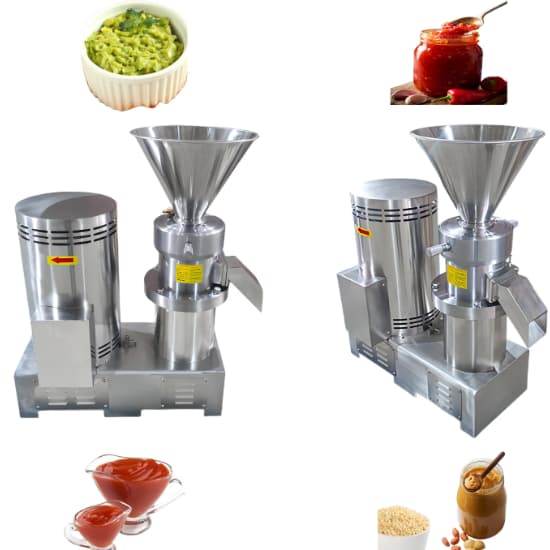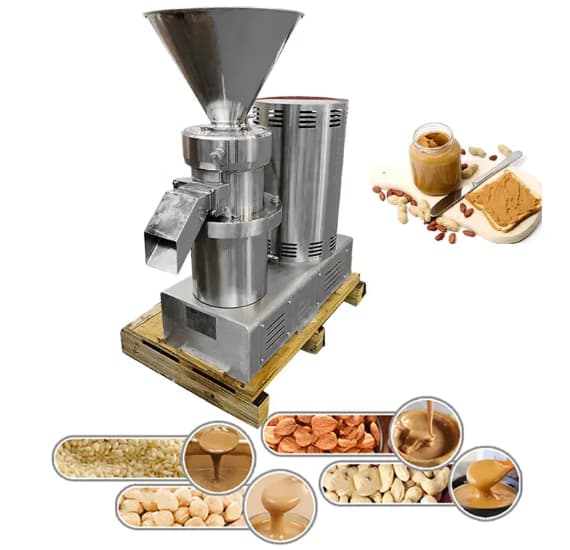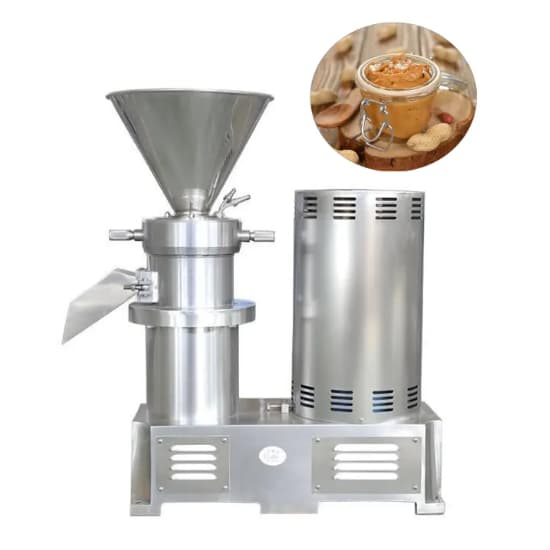Kirish: Yerfıstığı yog'adigan mashinasi nima?
A yerfıstığı yog'adigan mashina qovurilgan yeryong'oqlarni silliq yoki maydalangan xamirga maydalash uchun mo'ljallangan maxsus oziq-ovqat mahsulotlarini qayta ishlash uskunasi.. Ushbu mashinalar tabiiy va konservantlarsiz yeryong'oq moyiga talab ortib borayotganligi sababli mashhurlikka erishdi. Kichik hajmdagi uy jihozlaridan tortib yirik sanoat operatsiyalarigacha, yeryong'oq yog'ini tayyorlash mashinalari moslashuvchanlikni taklif qiladi, nazorat qilish, va yuqori mahsuldorlik.
Mashina odatda oziqlantiruvchi kabi komponentlarni o'z ichiga oladi, silliqlash tizimi (ko'pincha kolloid tegirmon), aralashtirish xonasi, va ba'zan avtomatik qadoqlash tizimi. Ushbu mashinalar yeryong'oqning tabiiy ta'mi va ozuqaviy tarkibini barqaror tuzilishga erishish uchun saqlab qolish uchun mo'ljallangan..

Yuzaki yog'i tayyorlash mashinalari turlari
Uyda foydalanish yeryong'oq yog'ini tayyorlash mashinasi
- Yilni o'lcham va qulay interfeys
- Sig'im: 0.5-1 kg/soat
- Quvvat iste'moli: 200-500 Vt
- DIY eman yog'ini sevuvchilar uchun javob beradi
Uy modellari oilalar yoki kichik kafelar uchun ideal. Ushbu mashinalar odatda oziq-ovqat uchun mo'ljallangan plastmassa yoki zanglamaydigan po'latdan yasalgan va oddiy boshqaruvga ega.
Tijorat yeryong'oq yog'ini maydalagich mashinasi
- Kafelar uchun mo'ljallangan, kichik fabrikalar, va startaplar
- Sig'im: 10-200 kg / h
- Kuch: 1.5-7,5 kVt
- Material: Zanglamaydigan po'lat 304 yoki 316
Ushbu turdagi yeryong'oq yog'ini tayyorlash mashinasi o'rtacha ish yukini ko'tarishi mumkin va ko'pincha sozlanishi silliqlash nozikligi bilan birga keladi..
Sanoat yong'oq yog'i ishlab chiqarish liniyasi
- To'liq avtomatlashtirilgan yechim
- Sig'im: 200-1000+ kg/soat
- Qovurishni o'z ichiga oladi, sovutish, po'choq, silliqlash, Aralashtirmoq, va qadoqlash
- Ko'pincha birlashtiradi a Kolloid tegirmoni nozik silliqlash uchun
Sanoat tizimlari barqarorlik va sifatni saqlab, yuqori talabni qondirishni maqsad qilgan yirik ishlab chiqaruvchilar uchun juda mos keladi.
Yuqori sifatli yeryong'oq yog'ini tayyorlash mashinasining asosiy xususiyatlari
Silliqlashning aniqligi va nozikligi
Yuqori sifatli mashina konfiguratsiyaga qarab 50-150 mikron zarracha o'lchamiga erishishi mumkin.
Chidamlilik va materiallar
Yuqori mashinalar korroziyaga chidamli bo'lib qurilgan SUS304/SUS316 zanglamaydigan po'lat, gigiena va uzoq xizmat muddatini ta'minlash.
Ko'p qirralilik
Ushbu mashinalar ham ishlov berishi mumkin:
- Bodom
- Kassa
- SeeMe urug'lari (Taxini uchun)
- Kungaboqar urug'lari
Sovutish tizimlari
Uzluksiz ish paytida qizib ketishning oldini olish uchun, mashinalarni o'z ichiga olishi mumkin:
- Havo sovutadigan tizimlar
- Suv ko'ylagi sovutish tizimlari
Tozalash qulayligi
Ba'zi modellarga CIP kiradi (Toza) tez va samarali sanitariya uchun tizimlar.

Yong'oq yog'ini tayyorlash mashinasida kolloid tegirmon
The Kolloid tegirmoni savdo va sanoat mashinalarida ishlatiladigan asosiy silliqlash komponenti.
Kolloid tegirmonning texnik xususiyatlari:
| Parametr | Spetsifikatsiya |
|---|---|
| G'aroviylikni maydalash | 50-150 mikron |
| Motor kuchi | 5.5 - 22 kvant |
| Kuchlanishi | 220V / 380V (odatlangan) |
| Material | SUS304/SUS316 zanglamaydigan po'lat |
| Rotor tezligi | 2800 Rpm |
| Sovutish tizimi | Havo yoki suvni sovutish |
| Oziqlantirish idishining hajmi | 10-50 litr |
| O'tkazish qobiliyati | 100-1000 kg / soat |
Kolloid tegirmon yuqori tezlikda kesish yordamida bir xil silliqlashni ta'minlaydi, silliqlash, va yuqori chastotali tebranish. Turli noziklik darajalari uchun sozlanishi va tozalash uchun qismlarga ajratish oson.
Yong'oq yog'ini tayyorlash mashinasi yordamida ishlab chiqarish jarayoni
1. Yong'oqni qovurish
Qovurish lazzatni oshiradi va yeryong'oqni maydalashni osonlashtiradi. O'rnatilgan qovurish moslamalari bo'lgan mashinalar ishlab chiqarishni soddalashtirishga yordam beradi.
2. Terini olib tashlash
Qovurilgandan keyin, yeryong'oqlar sovutiladi va puflagichlar yoki ishqalanish tozalagichlar yordamida teridan tozalanadi.
3. Kolloid tegirmon bilan maydalash
Yong'oqlar kolloid tegirmonga quyiladi, u erda ular mayda maydalanadi. Operatorlar ushbu bosqichda tekstura va yopishqoqlikni nazorat qilishlari mumkin.
4. Aralashtirish va homogenizatsiya
Tuz kabi qo'shimcha ingredientlar, shakar, yoki yog'lar qo'shiladi va bir tekis mustahkamlik uchun bir hil holga keltiriladi.
5. To'ldirish va qadoqlash
Zamonaviy mashinalar avtomatik to'ldirish va muhrlash tizimlarini o'z ichiga oladi, qadoqlashni tezlashtiradi va ifloslanish xavfini kamaytiradi.

Yong'oq yog'ini tayyorlash mashinasidan foydalanishning afzalliklari
Unumdorlik
Mashinalar qo'l mehnatini kamaytiradi va ishlab chiqarishni sezilarli darajada oshiradi.
Muvofiqlik va sifat
Bir xil tuzilishga erishing, tatib ko'rmoq, va har bir partiyada raf barqarorligi.
Gigiena
Zanglamaydigan po'latdan yasalgan dizaynlar ifloslanishni oldini oladi va oziq-ovqat xavfsizligi standartlariga mos keladi.
Tejamkor
Vaqt o'tishi bilan, uyda yeryong'oq yog'ini ishlab chiqarish autsorsingga qaraganda arzonroq bo'lishi mumkin.
Kengaytirish qobiliyati
Talab oshgani sayin, modulli tizimlar osongina yangilanishi yoki kengaytirilishi mumkin.
Yong'oq yog'ini tayyorlash mashinalarining taqqoslash jadvali
| Mashina turi | Sig'im | Kuch | Narxlar oralig'i |
| Uy foydalanish | 0.5-1 kg/soat | 200-500 Vt | $100 - $300 |
| Tijorat maydalagich | 10-200 kg / h | 1.5-7,5 kVt | $1,000 - $5,000 |
| Sanoat liniyasi | 200-1000 kg / soat | 7.5-22 kVt | $10,000 - $50,000+ |
Uzoq muddatli foydalanish uchun texnik xizmat ko'rsatish bo'yicha maslahatlar
Har kuni:
- Barcha aloqa yuzalarini tozalang
- Oqish yoki qizib ketishni tekshiring
- Oziqlantirish idishni va maydalash kamerasini sanitarizatsiya qiling
Oylik:
- Rulmanlar va dvigatelning ishlashini tekshiring
- Eskigan qistirmalarni yoki qistirmalarni almashtiring
- Harakatlanuvchi qismlarni moylash
Yong'oq yog'ini tayyorlash mashinasini qayerdan sotib olish mumkin
Ishonchli ishlab chiqaruvchilar:
- GEA Group (Germaniya)
- Tez orada Lih (Ayvon)
- Uzunroq mashinalar (Xitoy)
Onlayn platformalar:
- Alibaba
- Amazon (uy birliklari uchun)
- Global manbalar
Xarid qilishdan oldin, namunali videolarni so'rang, Sertifikatlar (Yamoq, Iso, Fda), va mijozlar sharhlari.
Mijozlarning muvaffaqiyati tarixi
Janubiy Afrikadagi kichik oziq-ovqat startapi a bilan boshlandi 100 kg/soat yong'oq yog'ini maydalagich. Ichida 6 oylar, ularning mahsuloti mahalliy supermarketlarda ro'yxatga olingan. Mashinaning samaradorligi va ishonchliligi mahsulot sifatini saqlab qolish bilan birga ularni tez o'lchash imkonini berdi.
Xulosa: Nima uchun yeryong'oq yog'ini tayyorlash mashinasiga sarmoya kiriting??
The yerfıstığı yog'adigan mashina oziq-ovqat tadbirkorlari uchun o'yin o'zgartiruvchi hisoblanadi, commercial kitchens, va sanoat ishlab chiqaruvchilari. orqali nozik silliqlash bilan Kolloid tegirmoni, izchil sifat, va kengaytiriladigan dizaynlar, bu mashinalar investitsiyalardan mustahkam daromad keltiradi.
Uyda organik yong'oq yog'ini tayyorlayapsizmi yoki to'liq ishlab chiqarish liniyasini rejalashtiryapsizmi, to'g'ri mashina sizning operatsiyalaringizni o'zgartirishi mumkin, rentabellikni oshirish, va ortib borayotgan bozor talabini qondirish.
